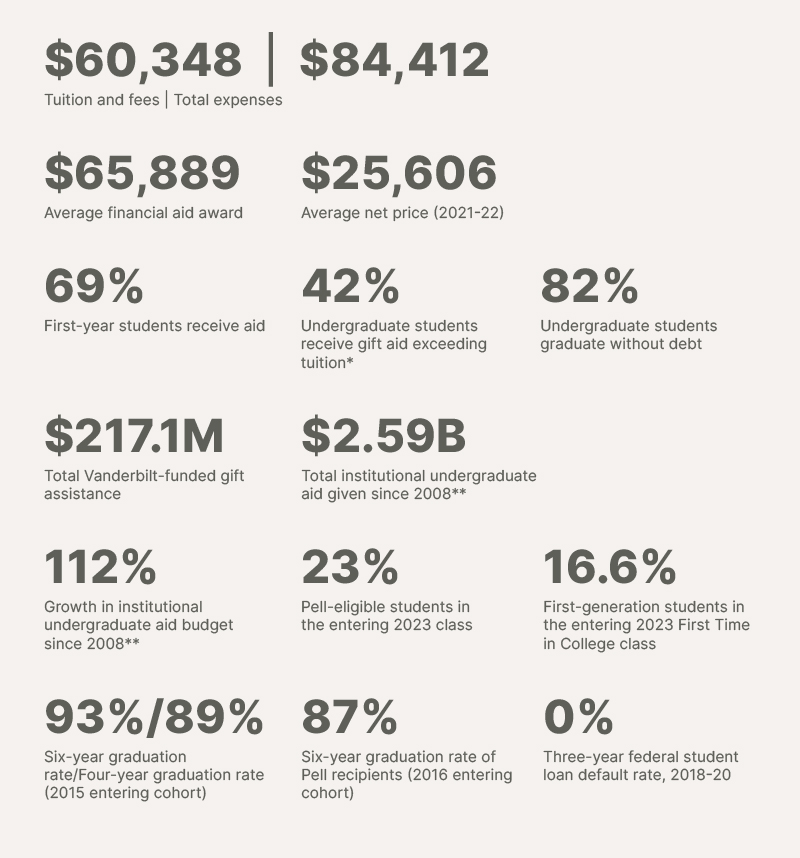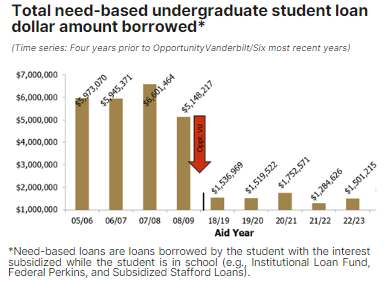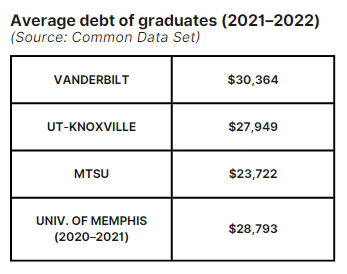By the Numbers

Getting into college is one thing, but that doesn’t always mean you can afford it. Lucky for me, Vanderbilt is one of the most financially inclusive schools.
OpportunityVanderbilt
In 2008, Vanderbilt launched Opportunity Vanderbilt, a no-loan program that gives grants instead of need-based loans to undergraduate students. Vanderbilt’s financial aid program includes three very distinct commitments to our undergraduate students:
- Since talent and promise recognize no social, economic or geographic boundaries, our admissions process is need-blind.
- Vanderbilt will meet 100 percent of a family’s demonstrated financial need.
- Financial aid awards do not include loans.
Vanderbilt has seen a tremendous drop in total student debt upon graduation since the program’s implementation. Compared with 2008–09 borrowing figures before the program, our students’ total amount borrowed has decreased by 71 percent. Additionally, the number of need-based borrowers has decreased by 72 percent over the same time period.


College Access and Success
Vanderbilt University has a long-standing tradition of actively and aggressively recruiting students from a diverse range of socioeconomic backgrounds. From our pioneering commitment to diversity outreach as the original Posse Foundation partner university, to award-winning access recruitment programs and one of the most generous access, completion and attainment-oriented financial aid policies in the nation, Vanderbilt has led the way in low-income student outreach and recruitment.
In 2016, Vanderbilt became one of the original 30 colleges and universities participating in the American Talent Initiative, which seeks to substantially expand the number of talented low-income and moderate-income students at America’s top-performing undergraduate institutions with the highest graduation rates. Together, the members of ATI, now numbering more than 100, have vowed to enroll and graduate 50,000 more low-income and moderate-income students by 2025. Since 2015–2016, participating institutions have already increased their enrollment of students eligible for federal Pell grants by nearly 7,800—and that number is set to grow in the years ahead. Vanderbilt has increased the number of first-year students receiving Federal Pell Grant assistance from 14 percent of the entering class of 2015 to 23 percent of the 2023 entering class.
Vanderbilt currently recruits in more than 45 U.S. states and territories and emphasizes visits to a variety of high schools, including many low-resourced, magnet, charter or other types of high schools that serve low-income and first-generation students and families. Vanderbilt also features a generous travel assistance program that defrays some of the financial costs of visiting campus for low-income students.
Vanderbilt is energetically engaging potential Pell-eligible students and is among the less than 1 percent of American private universities that communicate with these students as early as eighth grade. Using a multitude of sources, Vanderbilt specifically targets low-income and first-generation students and families with a robust communication strategy that includes fee-waiver information and assistance in navigating the college application process.
Vanderbilt is at the forefront of partnering with local and national community-based organizations to broaden access for thousands of students. Vanderbilt is now a national partner with the KIPP schools, QuestBridge, YES Prep Academies, Chicago Scholars, the Center for Student Opportunity, Say Yes to Education, Venture Scholars, and more than 100 other organizations and foundations worldwide. Vanderbilt hosts leaders of community-based organizations from across the country with the goal of deepening partnerships to benefit students.
First-generation student at Vanderbilt receiving Opportunity Vanderbilt support
Sawan Ahmed, Class of 2025, chose Vanderbilt because of the university’s reputation as a research leader. Now she is doing her own interdisciplinary research as a computer science major. Sawan continually seeks challenges that push her out of her comfort zone, such as teaching middle schoolers about coding as part of Vanderbilt’s Code Ignite student organization. She is discovering real-world applications of concepts she is learning in classes in data science, and she’s exploring ways to use her problem-solving skills to gain new insights and tackle new challenges. Her parents, who are of Somali descent, came to Tennessee for asylum. Sawan is a first-generation student and Nashville native. She enjoys connecting with her suitemates, who are fellow first-generation students with similar cultural backgrounds.
STARS College Network
Vanderbilt University has teamed up with 16 of the nation’s most prominent universities and colleges in a new effort to help students from small-town and rural America enroll in, succeed at and graduate from the undergraduate program of their choice.
The STARS (Small-Town And Rural Students) College Network will build on efforts to create pathways to college for students who might not otherwise recognize the full range of educational opportunities available to them. As part of the STARS Network, Vanderbilt University recognizes its responsibility and commitment to rural students, families and educators. Tennessee is a top five state for percentage of rural high school students, meaning Vanderbilt is uniquely positioned to specifically work with these talented students who live in our own backyard. To elevate and empower rural populations, Vanderbilt will implement a comprehensive, integrated statewide outreach plan including on-the-ground outreach, programming on the Vanderbilt campus, and professional development opportunities for rural educators.
Research shows that college graduates from rural areas often return to their communities, so efforts to help rural students get the greatest benefit from higher education can create a virtuous cycle of support, success and giving back to the next generation.
For more information, please contact the Vanderbilt Office of Federal Relations:
Christina West 202-216-4370 | Heather Bloemhard 202-216-4368
federalrelations@vanderbilt.edu
FY 2023